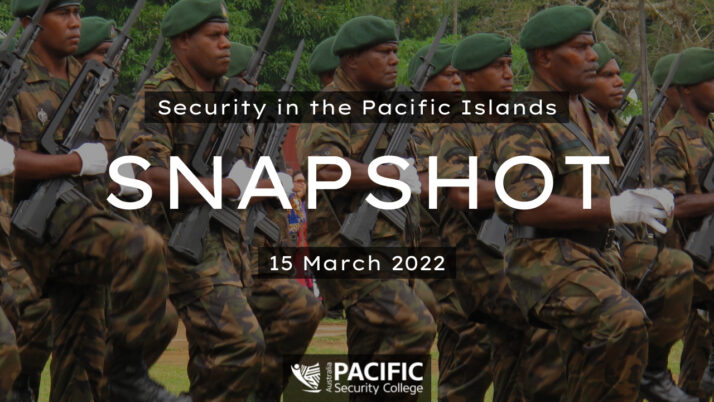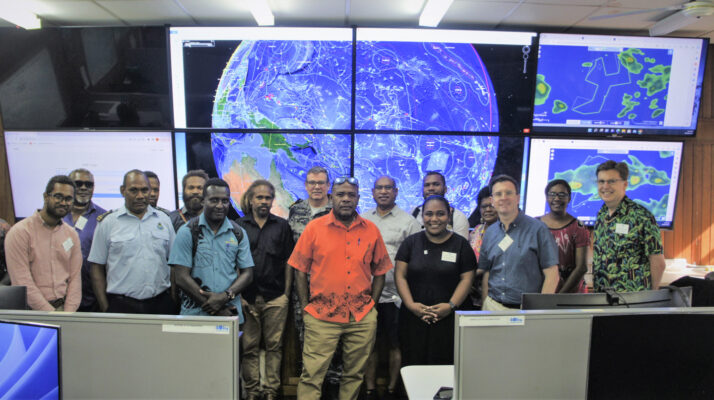Pacific Security Snapshot: 15 March 2022

Welcome to the first edition of our new summary of key security issues and events shaping the Pacific – and what lies ahead. This will be a short and snappy take on security across the Pacific region so you can stay informed of what’s happening in the Blue Pacific. It highlights a range of human and hard security developments as they unfold in our increasingly contested region.
Russia’s invasion of Ukraine is dominating global headlines but there has been plenty of manoeuvring in the Pacific in recent weeks.
While the Pacific Islands Forum (PIF) was quick to release a statement condemning Russia’s invasion, internal leadership tussles within the PIF have created some confusion.
News reports suggesting Secretary General Henry Puna would step down by June in order to prevent the Micronesian territories from leaving the Forum have been countered by claims from the Cook Islands government that they were not consulted and no agreement is yet in place.
The latest PIF manoeuvring happened soon after US Secretary of State Antony Blinken’s visit to Fiji, declaring “we see our long-term future in the Indo-Pacific”. He announced support on climate change and the opening of a new US embassy in the Solomon Islands. He then went to Melbourne for the QUAD meeting, signalling US intent to remain focused on the Indo-Pacific region despite escalating tensions in Ukraine. Although reporting of the QUAD has focused on nuclear submarines, the new alliance has promised 1 billion vaccines for the region and will see greater intelligence sharing and co-operation with the Pacific.
In other regional leadership news, long-time PNG diplomat Leonard Louma has been appointed the new Director General of the Melanesian Spearhead Group (MSG) secretariat, based in Vanuatu. The MSG has been paralysed in recent years under previous leadership and Indonesian pressure, trying to prevent full membership for West Papua in the sub-regional organisation which includes PNG, Solomon Islands, Vanuatu, Fiji and the FLNKS from New Caledonia.
As Covid19 infections continue to rise across many Pacific countries, vaccine diplomacy is still at work and health systems in some nations like PNG and the Solomons are buckling under the pressure. Check our regular Covid Trendlines for the latest stats.
Internet communications have been mostly restored in Tonga following the recent volcano eruption and tsunami, but recovery will take years for affected islands. The undersea cable has been fixed and Elon Musk has offered help with his satellite network. The Australian navy encountered a few mishaps in its deployment to Tonga with power problems and Covid19 infections on board, but has been able to quickly deliver substantial aid and assistance in the immediate aftermath together with the New Zealand defence force. China has dispatched two navy ships to help, while Japan also sent aid via its navy and air force.
While Chinese naval ships sent for disaster response have been mostly welcomed by Pacific nations, one naval ship passing between Australia and PNG sparked an incident by using a laser against a RAAF surveillance plane while in Australian territorial waters. Such incidents will heighten tensions in the Blue Pacific.
There was lots of khaki on display at the parade ground to welcome a new Commander of the PNGDF, Major General Mark Goina. One of the new Commander’s priorities will be security preparations ahead of PNG’s elections in April, which are often marred by violence.
In the Solomon Islands, the first batch of Chinese police officers have arrived who will train local police to improve “anti-riot capabilities”. Australia, which intervened to help the Solomons government restore order after riots in December, was surprised by the Solomon Islands government invitation to China to provide police training and noted this was the first time a Pacific government has sought Chinese help for domestic policing. No doubt the region will be watching closely amid questions of possible inter-operability and co-operation, as well as the implications for future deployments.
In the north Pacific, growing geopolitical tensions are prompting the US military to look at multiple sites on Guam to host a missile defence shield. Across Micronesia there is also growing concern about the slow-pace of COFA (Compacts of Free Association) negotiations between the US and the Micronesian states, some of which expire next year.
Russia’s invasion overshadowed the release of the latest IPCC report and both have security implications for the Pacific in the months and years ahead.
More Stories

Security Snapshot - 28 Mar 2024
Pacific Security Snapshot | 28 March 2024
Summary ➣ Heavy rains, floods, landslides and earthquakes batter the region ➣ Pacific submissions to the International Court of Justice (ICJ) on climate change responsibility ➣ Elections across the Pacific prompting changes to diplomatic relations and security arrangements ➣ Challenges for women in politics Climate Security Lives have been lost in PNG after a series…

Latest News - 4 Oct 2023
Regional and National Security Architecture in the Blue Pacific, Honiara, Solomon Islands
Former deputy secretary of the Pacific Islands Forum Mr Peter Forau, and CEO of Solomon Islands Broadcasting Corporation and former adviser to the Pacific Islands Forum Johnson Honimae join the Pacific Security College’s workshop on Regional and National Security Architecture in the Blue Pacific The recently concluded Regional and National Security Architecture in the…






